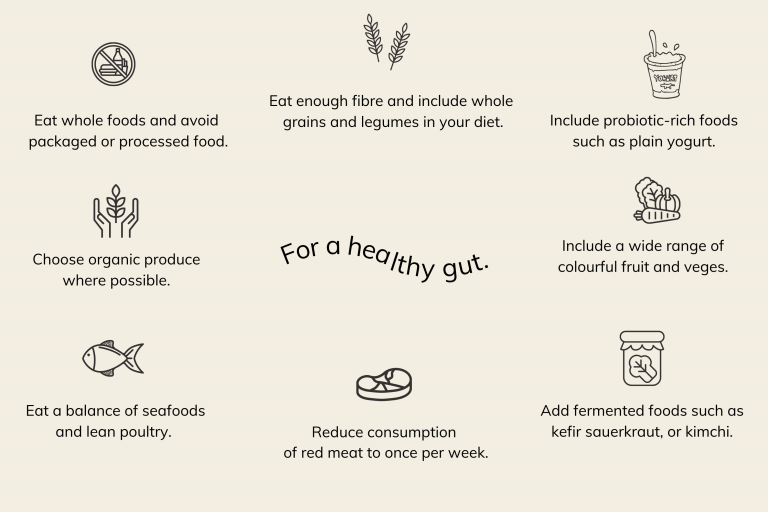How your gut bacteria could be the crucial link between the food you eat and how you feel.
Day after day we go about our lives paying no mind to the complex ecosystem of hundreds of bacterial species living within our gastrointestinal microbiota. A delicate balance of a variety of gut bacteria is required for a healthy gut, but it’s not until something starts to feel amiss, and we experience things such bloating, gas and diarrhoea that we begin to question what’s really going on inside our stomachs.
Gut symptoms may be an obvious indication of an underlying gut imbalance, but increasing evidence has associated gut microbiota to a host of gastrointestinal and extra-gastrointestinal diseases. This means gut inflammation and dysbiosis and can permeate beyond the gut walls and begin to impact the rest of our body and brain, which can lead to a whole host of cognitive and mood problems.


‘Insights into the gut-brain crosstalk have revealed a complex communication system that not only ensures the proper maintenance of gastrointestinal homeostasis, but is likely to have multiple effects on affect, motivation, and higher cognitive functions.’
Ann Gastroenterol. 2016; 29(2): 240. The gut-brain axis: interactions between enteric microbiota, central and enteric nervous systems. Tweet
The severity of these symptoms can vary from low mood, difficulty focusing and sleep disturbances, to more chronic mental illnesses and mood disorders including anxiety and depression. When we look at the relationship between the gut and our brain, it’s important to know that 90% of serotonin receptors are located in the gut.
Serotonin being the key hormone that stabilises our mood, feelings of well-being, and happiness, but also a hormone which impacts the entire body, enabling brain cells and other nervous system cells to communicate with each other.
So, where to from here?
Incorporating a healthy, balanced diet which focuses on whole foods and avoids inflammation-producing foods may be protective against low mood, depression and anxiety. Some of the foods recommended to improve mood and alleviate symptoms of mild depression and anxiety include: oysters, mussels, salmon, watercress, spinach, romaine lettuce, cauliflower, and strawberries.
Recent research cites further recommendations on food and lifestyle habits below:

Important note:
A better diet can help, but it’s only one part of treatment. Individualised treatment is recommended under the guidance of our Naturopath & Nutritionist Sarah Benna Doyle. For severe symptoms of depression it’s important to consult your doctor or healthcare professional immediately.
Want to get to the bottom of your gut or mood issues?
Explore our Gut Health Reset Package.
Whether you’re experiencing acute or chronic gut and health issues, this package is an evidence based approach to health which includes thorough consultations and pathology findings in order to get to the root cause of your symptoms. This package is suitable for those experiencing a range of health issues, as the GI Map Gut Testing allows us correctly trace the cause for many issues that originally present as:
- Irritable Bowel Syndrome (IBS): digestive issues like constipation, diarrhoea, bloating, gas, reflux, poor digestion, food intolerances, stomach pain.
- Mood disorders including: depression, anxiety and PMS.
- Skin conditions including: eczema, psoriasis, dermatitis, boils.
- Autoimmune conditions including: Rheumatoid arthritis, MS, Hashimoto’s thyroiditis, etc.
- Metabolic and hormonal issues: overweight, heavy and painful periods.
- Chronic Pain issues: fibromyalgia, inflammatory pain.
By getting to the root cause of these issues, we are able to apply evidence based therapies and advice in order to assist in the management and long-term correction of such issues. We also provide a preventative approach for those who experience mild health or digestive imbalances and want to understand the cause of these presentations.
Use the code GUTHEALTH for 10% off the package for the month of October only.
*Code valid for one per person. Code must be used online in order to redeem discount. Offer ends 11.59pm AEDT 31st October 2021.
Sources:
Gut microbiota’s effect on mental health: The gut-brain axis
Megan Clapp, 1 Nadia Aurora,1 Lindsey Herrera,1 Manisha Bhatia,1 Emily Wilen,1 and Sarah Wakefield2
Health Harvard Publishing: Gut Feelings: How Food Affects Your Mood
https://www.health.harvard.edu/blog/gut-feelings-how-food-affects-your-mood-2018120715548